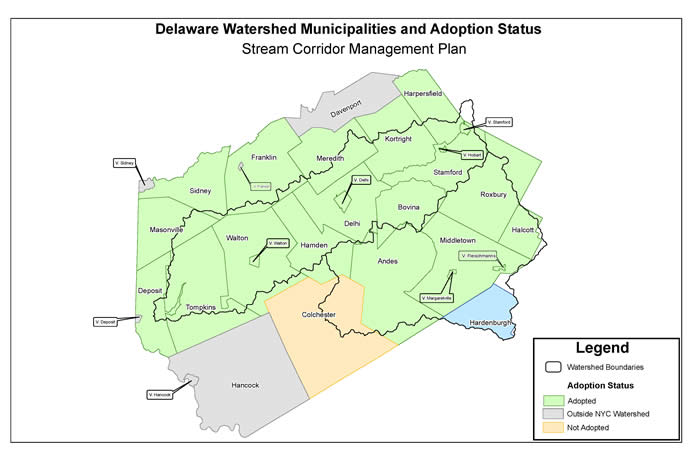Stream Management Plan Implementation
Guided by stream stewardship principles, the Delaware Watershed Program offers assistance to local communities, residents, and organizations to advance recommendations from Delaware Basin Stream Management Plans. Stream Management Plans have been written for the East Branch Delaware River and West Branch Delaware River. To learn more about what adoption of a stream management plan entails, please click here. We also have a sample of a memorandum of understanding between a town and the Delaware County Soil and Water Conservation District to illustrate how a town could move forward with plan implementation. Finally, the Delaware Watershed Advisory Committee, DCSWCD and NYCDEP utilize an annual action plan to organize their workload and priorities.
Stream Stewardship Principles
Management of natural stream systems often results in the perception of competing or inconsistent goals and objectives. Using sound, science-based principles, stream managers will find it easier to guide their work, and achieve a common ground between landowners, municipalities, regulatory agencies and others that play an important role in the health of our Catskill stream systems. These guiding principles set a common framework upon which stream managers may carry out their important activities (principles with additional text):
- We will work to protect and restore the environmental services provided by our streams and floodplains;
- We will work to protect and restore the health of our stream and floodplain ecosystems;
- Wherever possible, we will manage streams so as to maintain their naturally effective channel form and function;
- Wherever possible, we will manage floodplains as part of the natural stream system;
- Wherever possible, we will protect and restore mature forest in the riparian buffer;
- As we manage streams to protect public safety and investments in infrastructure, our actions in one location shouldn’t compromise the health of the stream upstream or downstream, or threaten the adjacent upland ecosystem through which the stream runs;
- We will strive to keep abreast of the state-of-the-science and best management practices related to streams and floodplains;
- We celebrate the role streams play in the natural heritage of our communities.
Who is eligible for assistance from the Stream Management Implementation Program?
Local municipality that has adopted the respective SCMP or a 501c-3 Not For Profit Corporation with a letter of support from a host municipality that has adopted the respective SCMP.
What projects are eligible?
Projects that are located within the East or West Delaware Basin, fall within a municipality that has adopted the appropriate stream management plan, follow the Stream Stewardship Principles and are consistent with the Stream Management Plans.
Categories of Funding and Examples
Project Track Categories
Flood Management: development of flood management planning and response plans; flood recovery assistance; flood management training, including National Flood Insurance Program training.
Highway Infrastructure Improvement: upgrade undersized culverts; potential cost-share to properly size bridges to avoid channel constriction; potential cost-share to re-align streams upstream/downstream of bridges and culverts; incorporate vegetation into road embankments; utility crossing management; floodplain management of public lands.
Stormwater Implementation and/or Critical Area Seeding: hydro-seeding of open ditches etc.; implementation of stormwater techniques to retain and/or infiltrate stormwater into ground; wetland enhancement; filter strips; creation of rain garden and/or bioswales.
Recreation-Based Opportunities or Habitat Enhancements: stream access improvements; increasing navigability; development of watershed recreation plans; streamside amenities open to public; public fishing related projects; fisheries improvements and/or habitat enhancements (instream and in floodplain).
General Restoration Projects: any project not covered in the above categories. Such projects may include a gamut of projects from passive restoration to full-scale restoration projects that would provide multi-faceted benefits to a local community.
Program Track Categories
Education/Outreach/Training: workshops; newsletters; public meetings; school programs; stream clean-ups; volunteer plantings; educational kiosks; outreach materials; training programs/opportunities; stream celebration.
Planning and Assessment: floodplain management; coordinated flood response; technical assistance; land use/open space planning and/or incorporating stream management into economic development initiatives; creating/enhancing local control through environmental policies; collaborating at the county, regional and local levels supporting watershed communities.

